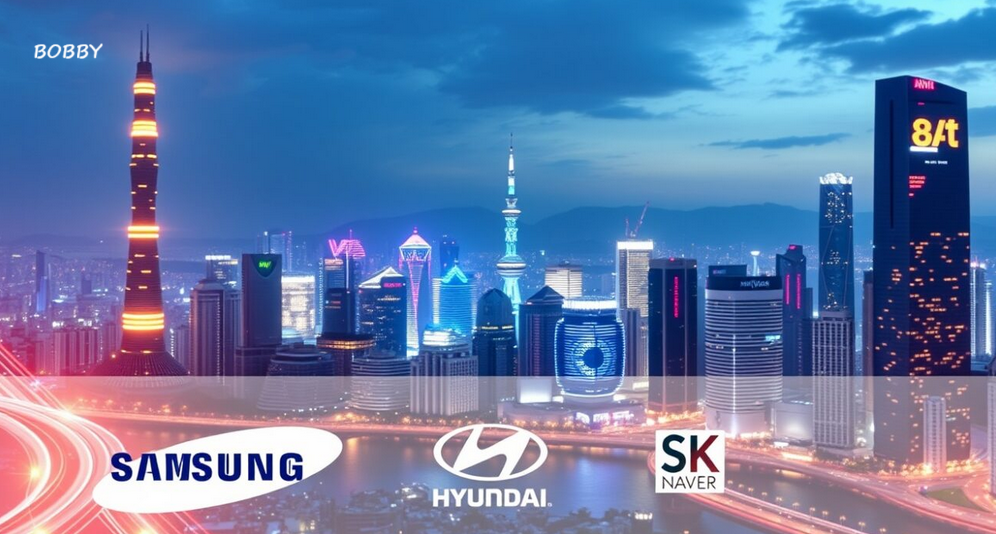US semiconductor giant Nvidia has announced a landmark deal to supply more than 260,000 of its most advanced artificial intelligence (AI) chips to South Korea’s government and leading companies, including Samsung, LG, and Hyundai. The chips will be used to power factories producing semiconductors, autonomous vehicles, and robots — ushering in what Nvidia’s CEO Jensen Huang called the ability for South Korea to “produce intelligence as a new export.”
While Nvidia did not disclose the total value of the deal, it marks one of the company’s most significant global partnerships to date. The move underscores Nvidia’s growing role in shaping AI-driven manufacturing and data infrastructure worldwide.
South Korea: A New AI Powerhouse
South Korea’s ambition to become a leading regional hub for artificial intelligence aligns perfectly with Nvidia’s strategic expansion. According to CEO Jensen Huang, the nation’s access to energy, industrial capacity, and land availability makes it an ideal location to develop AI computing infrastructure.
President Lee Jae Myung has also made AI investment a national priority, particularly in response to global trade tensions and US tariffs. As part of the agreement, the South Korean government plans to create a “sovereign AI” system, allowing it to maintain control over its national AI computing resources.
Over 50,000 Nvidia chips will power data centers at the National AI Computing Center, as well as facilities run by major South Korean tech companies such as Kakao and Naver. The remaining chips will be distributed among industrial giants including Samsung, LG, and Hyundai, supporting smart manufacturing, robotics, and self-driving vehicle technology.
Creating Digital Twins and Smart Factories
Speaking at the Asia-Pacific Economic Cooperation (APEC) CEO summit in Gyeongju, South Korea, Huang highlighted that the new AI chips will enable companies to build digital twins — virtual replicas of physical factories around the world.
These digital twins will allow engineers to simulate production processes, identify inefficiencies, and implement improvements in real time. This approach represents a major step toward fully automated, AI-managed factories, improving productivity and reducing costs across multiple industries.
Nvidia’s Expanding Global AI Infrastructure
The South Korean deal is part of Nvidia’s ongoing effort to expand its global AI ecosystem. In recent months, Nvidia has entered into several major partnerships worldwide, contributing to its unprecedented valuation of $5 trillion, making it the most valuable company in the world as of this week.
These strategic collaborations are helping Nvidia deepen its influence across key sectors — from cloud computing and energy to automotive and consumer technology. The company’s AI chips are now central to how industries manage big data, automate systems, and deploy advanced machine learning applications.
Caught Between the US and China
Despite its remarkable global success, Nvidia continues to navigate complex geopolitical challenges. The company remains deeply affected by the ongoing US-China trade war, which has restricted the export of advanced AI chips to China — once one of Nvidia’s largest markets.
“We used to have 95% of the AI market share in China. Now, it’s 0%. I’m disappointed by that,” Huang said during his South Korea visit.
China accounted for over a tenth of Nvidia’s total revenue last year. However, US export controls have significantly limited Nvidia’s ability to sell its most advanced processors — including the Blackwell series — to Chinese firms.
Following a recent meeting between President Donald Trump and President Xi Jinping, there have been signs of potential discussions between Beijing and Nvidia to explore possible sales under revised trade conditions. Trump mentioned that the US government would act as a “referee” rather than a participant in those talks.
Huang expressed optimism about future cooperation, stating:
“It’s in the best interest of America to have access to the China market, and in China’s interest to work with American technology companies. We’d like to see US technology become the global standard.”
AI, Innovation, and Security Concerns
While Nvidia’s ambitions are global, Washington continues to scrutinize chip exports to China due to national security concerns. Policymakers fear that advanced AI processors could be used to enhance China’s military and surveillance capabilities.
At the same time, US restrictions have spurred innovation within China. Companies such as Huawei and Alibaba have accelerated their development of homegrown AI chips, claiming performance levels that rival Nvidia’s. Beijing has also urged domestic firms to source components locally, further supporting its goal of technological self-sufficiency.
Huang acknowledged China’s growing capabilities, saying, “We respect the technological strengths of China and its progress in chip design.”
Nvidia’s Key Manufacturing Partners
Although Nvidia is known as a chip designer, it does not manufacture its own products. The company relies heavily on a network of Asia-Pacific manufacturing partners, including TSMC, Samsung, and SK Hynix.
TSMC (Taiwan Semiconductor Manufacturing Company) produces Nvidia’s most advanced AI chips, such as the Blackwell series, using cutting-edge semiconductor fabrication technology. Meanwhile, Samsung contributes components for Nvidia’s H20 processors — specialized versions designed for the Chinese market to comply with US export restrictions.
These partnerships highlight Nvidia’s dependence on the broader Asia-Pacific supply chain, which remains critical to its global production and innovation strategy.
Nvidia’s Growing Portfolio and Market Optimism
Beyond the South Korean deal, Nvidia has continued to sign new partnerships with global enterprises and government institutions. Recent collaborations include agreements with the US Department of Energy, Nokia, Uber, and Stellantis. Each of these partnerships reinforces Nvidia’s leadership in AI infrastructure, software integration, and high-performance computing.
The announcement of potential trade talks between the US and China has also lifted investor confidence. Nvidia’s stock surged following the news, reflecting renewed optimism that the company might regain partial access to the Chinese market — one of the world’s largest for AI applications.
A New Era of AI-Driven Manufacturing
Nvidia’s move to deliver over 260,000 AI chips to South Korea represents more than a business expansion — it signals a new chapter in global AI adoption. With these chips, South Korea will not only enhance its industrial capacity but also position itself as a leading exporter of intelligence and innovation.




